Analysis of Strengths and Weaknesses in Dispute Resolution
VerifiedAdded on 2023/06/10
|8
|2009
|266
Essay
AI Summary
This essay provides a detailed examination of dispute resolution methods, focusing on their strengths and weaknesses. It begins by introducing the concept of alternative dispute resolution (ADR) as a means of resolving disputes outside of court, highlighting its growing importance in both commercial and legal contexts. The essay then delves into three primary ADR methods: negotiation, arbitration, and mediation, explaining their distinct characteristics and processes. It discusses the advantages of ADR, such as cost-effectiveness, time savings, and the ability to tailor solutions to specific needs. The essay also acknowledges the potential drawbacks of ADR, including the possibility of a lack of binding outcomes in some processes and potential costs associated with expert arbitrators. Ultimately, the essay concludes by emphasizing the benefits of ADR, particularly its role in reducing court burdens and empowering parties to actively participate in the resolution of their disputes.

Running head: STRENGTH AND WEAKNESSES OF DISPUTE RESOLUTION
Strengths and Weaknesses of Dispute Resolution
Name of the Student
Name of the University
Author Note
Strengths and Weaknesses of Dispute Resolution
Name of the Student
Name of the University
Author Note
Paraphrase This Document
Need a fresh take? Get an instant paraphrase of this document with our AI Paraphraser
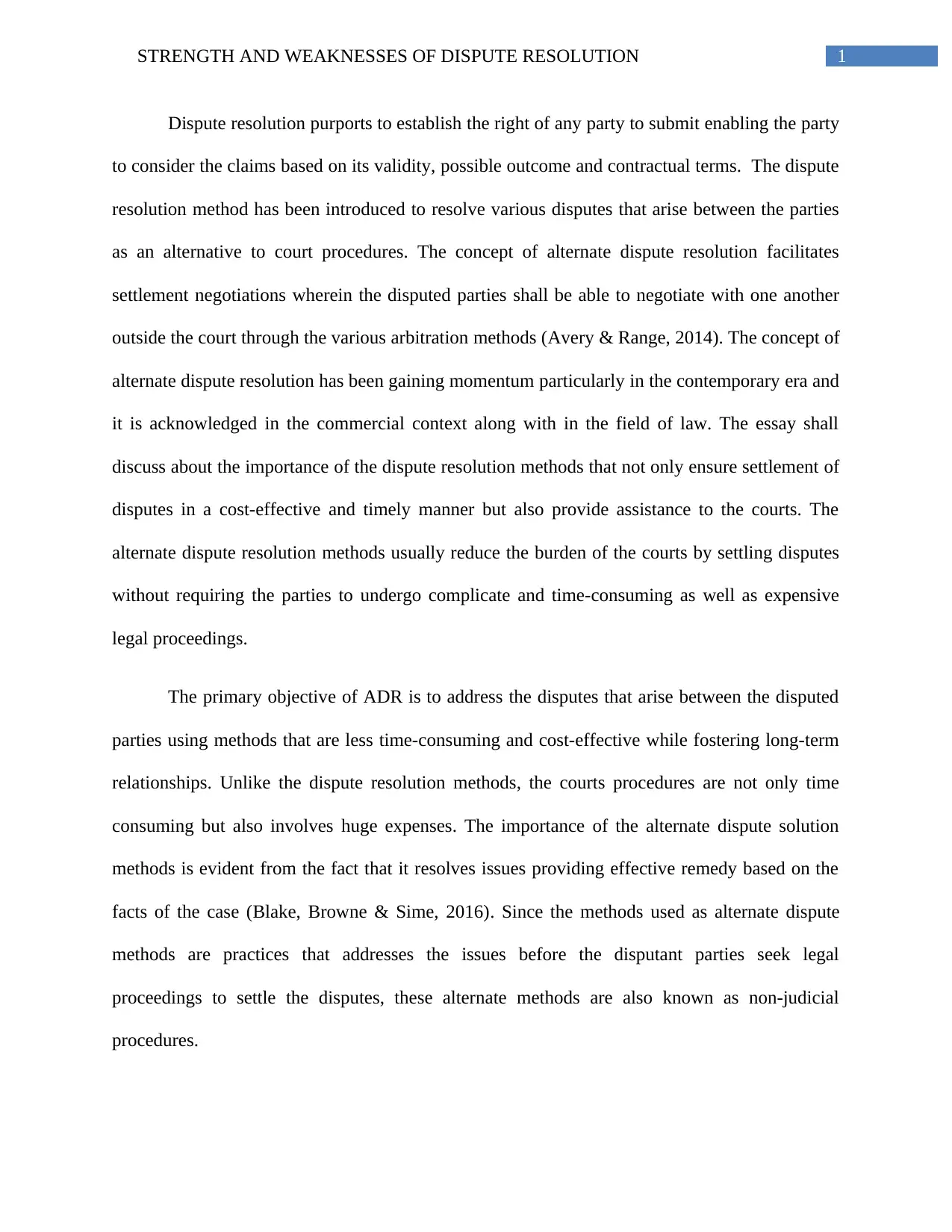
1STRENGTH AND WEAKNESSES OF DISPUTE RESOLUTION
Dispute resolution purports to establish the right of any party to submit enabling the party
to consider the claims based on its validity, possible outcome and contractual terms. The dispute
resolution method has been introduced to resolve various disputes that arise between the parties
as an alternative to court procedures. The concept of alternate dispute resolution facilitates
settlement negotiations wherein the disputed parties shall be able to negotiate with one another
outside the court through the various arbitration methods (Avery & Range, 2014). The concept of
alternate dispute resolution has been gaining momentum particularly in the contemporary era and
it is acknowledged in the commercial context along with in the field of law. The essay shall
discuss about the importance of the dispute resolution methods that not only ensure settlement of
disputes in a cost-effective and timely manner but also provide assistance to the courts. The
alternate dispute resolution methods usually reduce the burden of the courts by settling disputes
without requiring the parties to undergo complicate and time-consuming as well as expensive
legal proceedings.
The primary objective of ADR is to address the disputes that arise between the disputed
parties using methods that are less time-consuming and cost-effective while fostering long-term
relationships. Unlike the dispute resolution methods, the courts procedures are not only time
consuming but also involves huge expenses. The importance of the alternate dispute solution
methods is evident from the fact that it resolves issues providing effective remedy based on the
facts of the case (Blake, Browne & Sime, 2016). Since the methods used as alternate dispute
methods are practices that addresses the issues before the disputant parties seek legal
proceedings to settle the disputes, these alternate methods are also known as non-judicial
procedures.
Dispute resolution purports to establish the right of any party to submit enabling the party
to consider the claims based on its validity, possible outcome and contractual terms. The dispute
resolution method has been introduced to resolve various disputes that arise between the parties
as an alternative to court procedures. The concept of alternate dispute resolution facilitates
settlement negotiations wherein the disputed parties shall be able to negotiate with one another
outside the court through the various arbitration methods (Avery & Range, 2014). The concept of
alternate dispute resolution has been gaining momentum particularly in the contemporary era and
it is acknowledged in the commercial context along with in the field of law. The essay shall
discuss about the importance of the dispute resolution methods that not only ensure settlement of
disputes in a cost-effective and timely manner but also provide assistance to the courts. The
alternate dispute resolution methods usually reduce the burden of the courts by settling disputes
without requiring the parties to undergo complicate and time-consuming as well as expensive
legal proceedings.
The primary objective of ADR is to address the disputes that arise between the disputed
parties using methods that are less time-consuming and cost-effective while fostering long-term
relationships. Unlike the dispute resolution methods, the courts procedures are not only time
consuming but also involves huge expenses. The importance of the alternate dispute solution
methods is evident from the fact that it resolves issues providing effective remedy based on the
facts of the case (Blake, Browne & Sime, 2016). Since the methods used as alternate dispute
methods are practices that addresses the issues before the disputant parties seek legal
proceedings to settle the disputes, these alternate methods are also known as non-judicial
procedures.
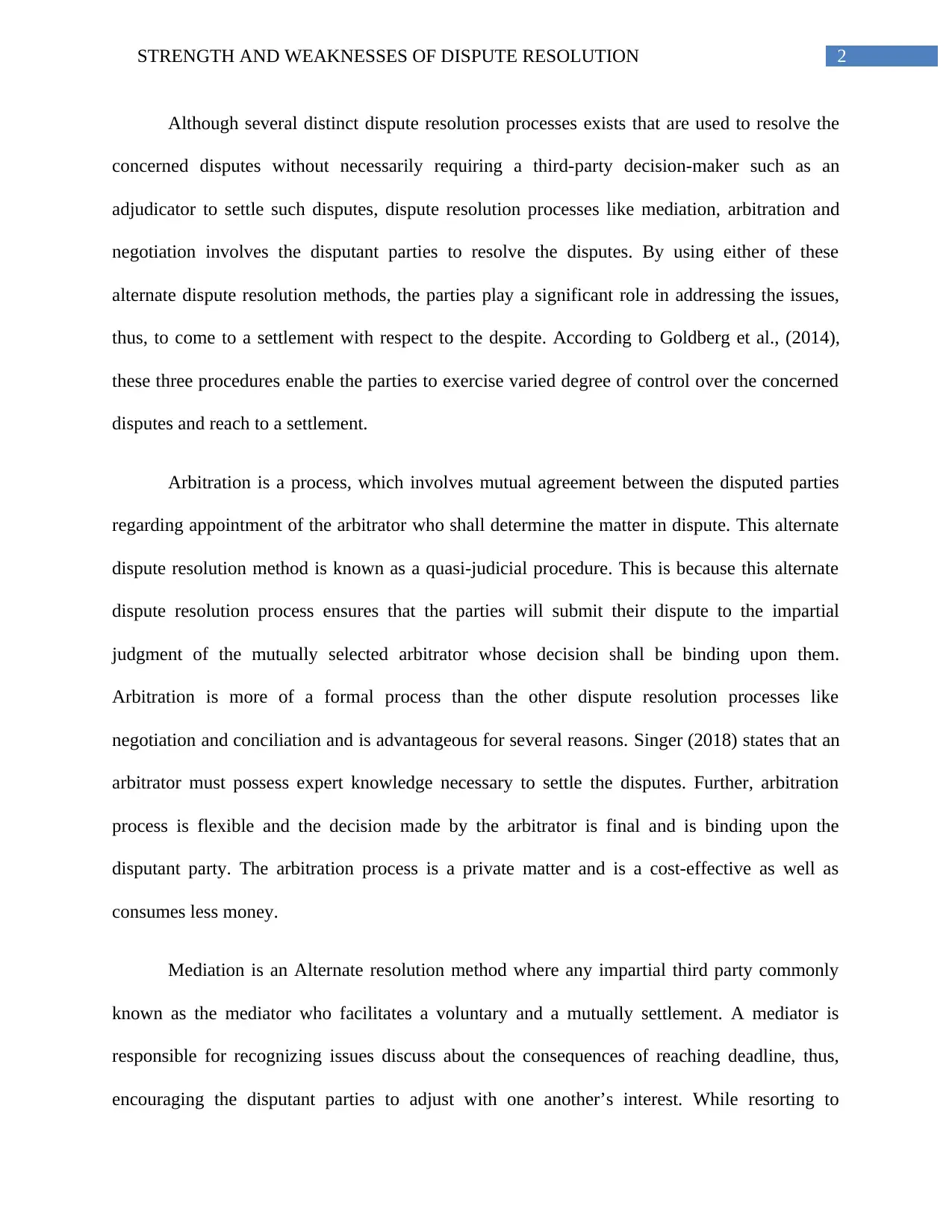
2STRENGTH AND WEAKNESSES OF DISPUTE RESOLUTION
Although several distinct dispute resolution processes exists that are used to resolve the
concerned disputes without necessarily requiring a third-party decision-maker such as an
adjudicator to settle such disputes, dispute resolution processes like mediation, arbitration and
negotiation involves the disputant parties to resolve the disputes. By using either of these
alternate dispute resolution methods, the parties play a significant role in addressing the issues,
thus, to come to a settlement with respect to the despite. According to Goldberg et al., (2014),
these three procedures enable the parties to exercise varied degree of control over the concerned
disputes and reach to a settlement.
Arbitration is a process, which involves mutual agreement between the disputed parties
regarding appointment of the arbitrator who shall determine the matter in dispute. This alternate
dispute resolution method is known as a quasi-judicial procedure. This is because this alternate
dispute resolution process ensures that the parties will submit their dispute to the impartial
judgment of the mutually selected arbitrator whose decision shall be binding upon them.
Arbitration is more of a formal process than the other dispute resolution processes like
negotiation and conciliation and is advantageous for several reasons. Singer (2018) states that an
arbitrator must possess expert knowledge necessary to settle the disputes. Further, arbitration
process is flexible and the decision made by the arbitrator is final and is binding upon the
disputant party. The arbitration process is a private matter and is a cost-effective as well as
consumes less money.
Mediation is an Alternate resolution method where any impartial third party commonly
known as the mediator who facilitates a voluntary and a mutually settlement. A mediator is
responsible for recognizing issues discuss about the consequences of reaching deadline, thus,
encouraging the disputant parties to adjust with one another’s interest. While resorting to
Although several distinct dispute resolution processes exists that are used to resolve the
concerned disputes without necessarily requiring a third-party decision-maker such as an
adjudicator to settle such disputes, dispute resolution processes like mediation, arbitration and
negotiation involves the disputant parties to resolve the disputes. By using either of these
alternate dispute resolution methods, the parties play a significant role in addressing the issues,
thus, to come to a settlement with respect to the despite. According to Goldberg et al., (2014),
these three procedures enable the parties to exercise varied degree of control over the concerned
disputes and reach to a settlement.
Arbitration is a process, which involves mutual agreement between the disputed parties
regarding appointment of the arbitrator who shall determine the matter in dispute. This alternate
dispute resolution method is known as a quasi-judicial procedure. This is because this alternate
dispute resolution process ensures that the parties will submit their dispute to the impartial
judgment of the mutually selected arbitrator whose decision shall be binding upon them.
Arbitration is more of a formal process than the other dispute resolution processes like
negotiation and conciliation and is advantageous for several reasons. Singer (2018) states that an
arbitrator must possess expert knowledge necessary to settle the disputes. Further, arbitration
process is flexible and the decision made by the arbitrator is final and is binding upon the
disputant party. The arbitration process is a private matter and is a cost-effective as well as
consumes less money.
Mediation is an Alternate resolution method where any impartial third party commonly
known as the mediator who facilitates a voluntary and a mutually settlement. A mediator is
responsible for recognizing issues discuss about the consequences of reaching deadline, thus,
encouraging the disputant parties to adjust with one another’s interest. While resorting to
⊘ This is a preview!⊘
Do you want full access?
Subscribe today to unlock all pages.

Trusted by 1+ million students worldwide
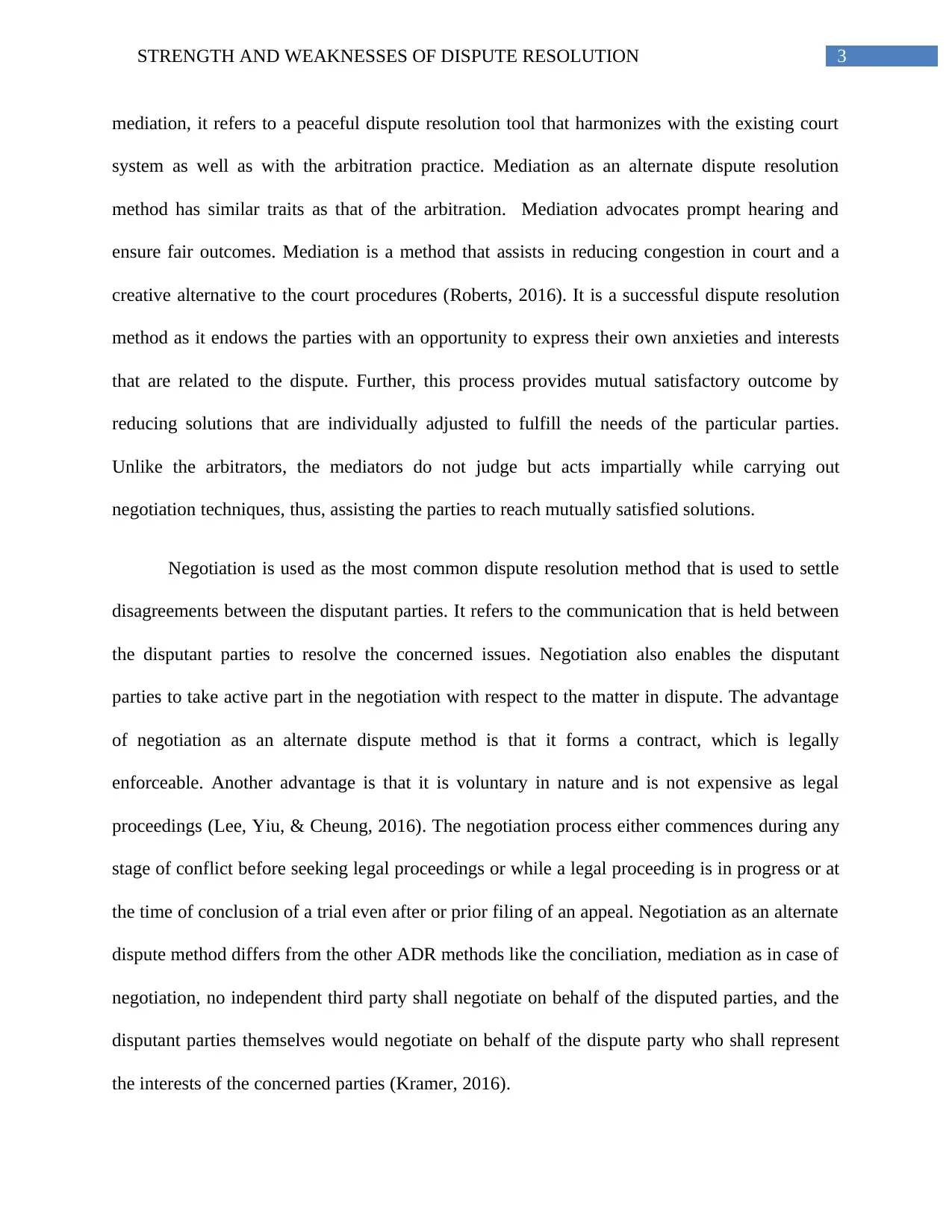
3STRENGTH AND WEAKNESSES OF DISPUTE RESOLUTION
mediation, it refers to a peaceful dispute resolution tool that harmonizes with the existing court
system as well as with the arbitration practice. Mediation as an alternate dispute resolution
method has similar traits as that of the arbitration. Mediation advocates prompt hearing and
ensure fair outcomes. Mediation is a method that assists in reducing congestion in court and a
creative alternative to the court procedures (Roberts, 2016). It is a successful dispute resolution
method as it endows the parties with an opportunity to express their own anxieties and interests
that are related to the dispute. Further, this process provides mutual satisfactory outcome by
reducing solutions that are individually adjusted to fulfill the needs of the particular parties.
Unlike the arbitrators, the mediators do not judge but acts impartially while carrying out
negotiation techniques, thus, assisting the parties to reach mutually satisfied solutions.
Negotiation is used as the most common dispute resolution method that is used to settle
disagreements between the disputant parties. It refers to the communication that is held between
the disputant parties to resolve the concerned issues. Negotiation also enables the disputant
parties to take active part in the negotiation with respect to the matter in dispute. The advantage
of negotiation as an alternate dispute method is that it forms a contract, which is legally
enforceable. Another advantage is that it is voluntary in nature and is not expensive as legal
proceedings (Lee, Yiu, & Cheung, 2016). The negotiation process either commences during any
stage of conflict before seeking legal proceedings or while a legal proceeding is in progress or at
the time of conclusion of a trial even after or prior filing of an appeal. Negotiation as an alternate
dispute method differs from the other ADR methods like the conciliation, mediation as in case of
negotiation, no independent third party shall negotiate on behalf of the disputed parties, and the
disputant parties themselves would negotiate on behalf of the dispute party who shall represent
the interests of the concerned parties (Kramer, 2016).
mediation, it refers to a peaceful dispute resolution tool that harmonizes with the existing court
system as well as with the arbitration practice. Mediation as an alternate dispute resolution
method has similar traits as that of the arbitration. Mediation advocates prompt hearing and
ensure fair outcomes. Mediation is a method that assists in reducing congestion in court and a
creative alternative to the court procedures (Roberts, 2016). It is a successful dispute resolution
method as it endows the parties with an opportunity to express their own anxieties and interests
that are related to the dispute. Further, this process provides mutual satisfactory outcome by
reducing solutions that are individually adjusted to fulfill the needs of the particular parties.
Unlike the arbitrators, the mediators do not judge but acts impartially while carrying out
negotiation techniques, thus, assisting the parties to reach mutually satisfied solutions.
Negotiation is used as the most common dispute resolution method that is used to settle
disagreements between the disputant parties. It refers to the communication that is held between
the disputant parties to resolve the concerned issues. Negotiation also enables the disputant
parties to take active part in the negotiation with respect to the matter in dispute. The advantage
of negotiation as an alternate dispute method is that it forms a contract, which is legally
enforceable. Another advantage is that it is voluntary in nature and is not expensive as legal
proceedings (Lee, Yiu, & Cheung, 2016). The negotiation process either commences during any
stage of conflict before seeking legal proceedings or while a legal proceeding is in progress or at
the time of conclusion of a trial even after or prior filing of an appeal. Negotiation as an alternate
dispute method differs from the other ADR methods like the conciliation, mediation as in case of
negotiation, no independent third party shall negotiate on behalf of the disputed parties, and the
disputant parties themselves would negotiate on behalf of the dispute party who shall represent
the interests of the concerned parties (Kramer, 2016).
Paraphrase This Document
Need a fresh take? Get an instant paraphrase of this document with our AI Paraphraser
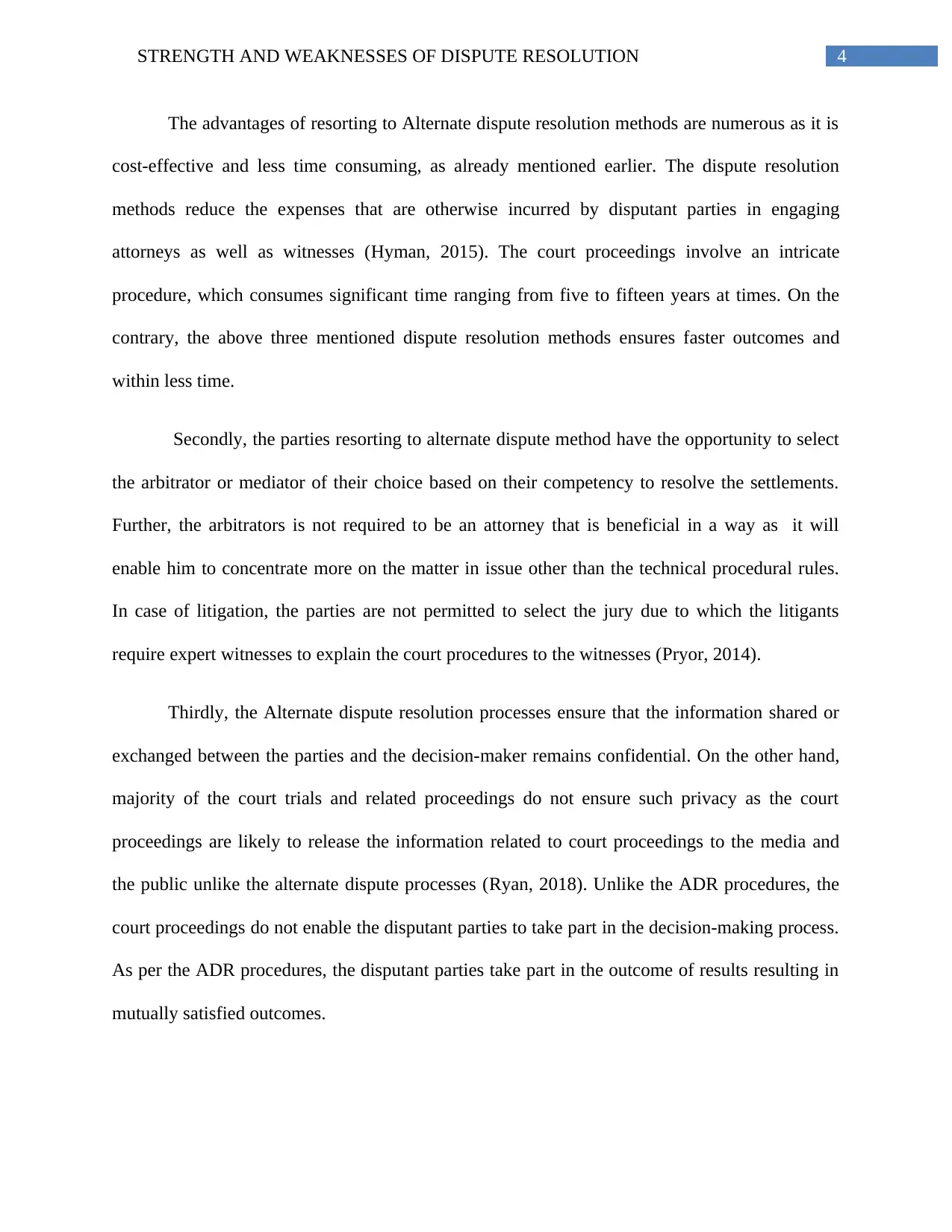
4STRENGTH AND WEAKNESSES OF DISPUTE RESOLUTION
The advantages of resorting to Alternate dispute resolution methods are numerous as it is
cost-effective and less time consuming, as already mentioned earlier. The dispute resolution
methods reduce the expenses that are otherwise incurred by disputant parties in engaging
attorneys as well as witnesses (Hyman, 2015). The court proceedings involve an intricate
procedure, which consumes significant time ranging from five to fifteen years at times. On the
contrary, the above three mentioned dispute resolution methods ensures faster outcomes and
within less time.
Secondly, the parties resorting to alternate dispute method have the opportunity to select
the arbitrator or mediator of their choice based on their competency to resolve the settlements.
Further, the arbitrators is not required to be an attorney that is beneficial in a way as it will
enable him to concentrate more on the matter in issue other than the technical procedural rules.
In case of litigation, the parties are not permitted to select the jury due to which the litigants
require expert witnesses to explain the court procedures to the witnesses (Pryor, 2014).
Thirdly, the Alternate dispute resolution processes ensure that the information shared or
exchanged between the parties and the decision-maker remains confidential. On the other hand,
majority of the court trials and related proceedings do not ensure such privacy as the court
proceedings are likely to release the information related to court proceedings to the media and
the public unlike the alternate dispute processes (Ryan, 2018). Unlike the ADR procedures, the
court proceedings do not enable the disputant parties to take part in the decision-making process.
As per the ADR procedures, the disputant parties take part in the outcome of results resulting in
mutually satisfied outcomes.
The advantages of resorting to Alternate dispute resolution methods are numerous as it is
cost-effective and less time consuming, as already mentioned earlier. The dispute resolution
methods reduce the expenses that are otherwise incurred by disputant parties in engaging
attorneys as well as witnesses (Hyman, 2015). The court proceedings involve an intricate
procedure, which consumes significant time ranging from five to fifteen years at times. On the
contrary, the above three mentioned dispute resolution methods ensures faster outcomes and
within less time.
Secondly, the parties resorting to alternate dispute method have the opportunity to select
the arbitrator or mediator of their choice based on their competency to resolve the settlements.
Further, the arbitrators is not required to be an attorney that is beneficial in a way as it will
enable him to concentrate more on the matter in issue other than the technical procedural rules.
In case of litigation, the parties are not permitted to select the jury due to which the litigants
require expert witnesses to explain the court procedures to the witnesses (Pryor, 2014).
Thirdly, the Alternate dispute resolution processes ensure that the information shared or
exchanged between the parties and the decision-maker remains confidential. On the other hand,
majority of the court trials and related proceedings do not ensure such privacy as the court
proceedings are likely to release the information related to court proceedings to the media and
the public unlike the alternate dispute processes (Ryan, 2018). Unlike the ADR procedures, the
court proceedings do not enable the disputant parties to take part in the decision-making process.
As per the ADR procedures, the disputant parties take part in the outcome of results resulting in
mutually satisfied outcomes.
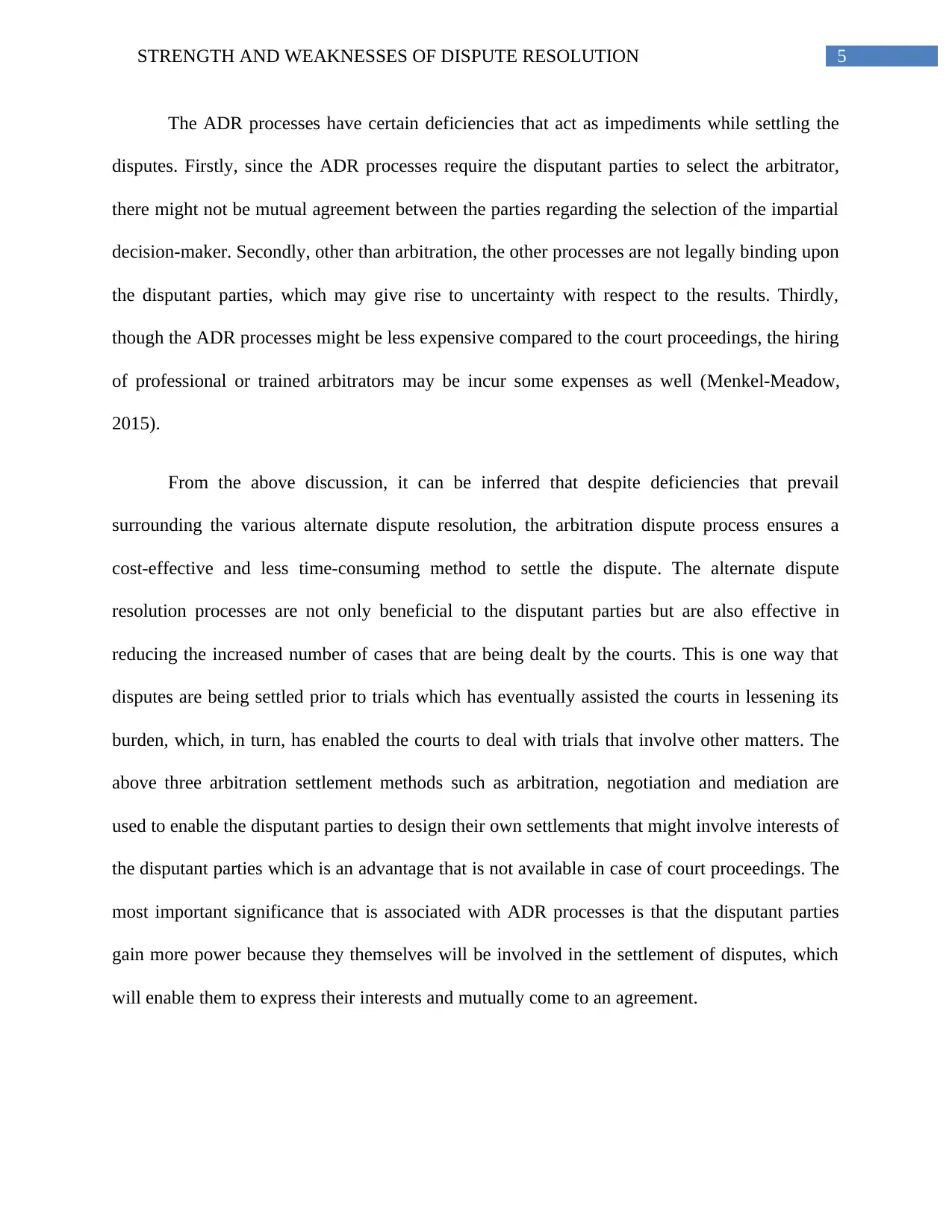
5STRENGTH AND WEAKNESSES OF DISPUTE RESOLUTION
The ADR processes have certain deficiencies that act as impediments while settling the
disputes. Firstly, since the ADR processes require the disputant parties to select the arbitrator,
there might not be mutual agreement between the parties regarding the selection of the impartial
decision-maker. Secondly, other than arbitration, the other processes are not legally binding upon
the disputant parties, which may give rise to uncertainty with respect to the results. Thirdly,
though the ADR processes might be less expensive compared to the court proceedings, the hiring
of professional or trained arbitrators may be incur some expenses as well (Menkel-Meadow,
2015).
From the above discussion, it can be inferred that despite deficiencies that prevail
surrounding the various alternate dispute resolution, the arbitration dispute process ensures a
cost-effective and less time-consuming method to settle the dispute. The alternate dispute
resolution processes are not only beneficial to the disputant parties but are also effective in
reducing the increased number of cases that are being dealt by the courts. This is one way that
disputes are being settled prior to trials which has eventually assisted the courts in lessening its
burden, which, in turn, has enabled the courts to deal with trials that involve other matters. The
above three arbitration settlement methods such as arbitration, negotiation and mediation are
used to enable the disputant parties to design their own settlements that might involve interests of
the disputant parties which is an advantage that is not available in case of court proceedings. The
most important significance that is associated with ADR processes is that the disputant parties
gain more power because they themselves will be involved in the settlement of disputes, which
will enable them to express their interests and mutually come to an agreement.
The ADR processes have certain deficiencies that act as impediments while settling the
disputes. Firstly, since the ADR processes require the disputant parties to select the arbitrator,
there might not be mutual agreement between the parties regarding the selection of the impartial
decision-maker. Secondly, other than arbitration, the other processes are not legally binding upon
the disputant parties, which may give rise to uncertainty with respect to the results. Thirdly,
though the ADR processes might be less expensive compared to the court proceedings, the hiring
of professional or trained arbitrators may be incur some expenses as well (Menkel-Meadow,
2015).
From the above discussion, it can be inferred that despite deficiencies that prevail
surrounding the various alternate dispute resolution, the arbitration dispute process ensures a
cost-effective and less time-consuming method to settle the dispute. The alternate dispute
resolution processes are not only beneficial to the disputant parties but are also effective in
reducing the increased number of cases that are being dealt by the courts. This is one way that
disputes are being settled prior to trials which has eventually assisted the courts in lessening its
burden, which, in turn, has enabled the courts to deal with trials that involve other matters. The
above three arbitration settlement methods such as arbitration, negotiation and mediation are
used to enable the disputant parties to design their own settlements that might involve interests of
the disputant parties which is an advantage that is not available in case of court proceedings. The
most important significance that is associated with ADR processes is that the disputant parties
gain more power because they themselves will be involved in the settlement of disputes, which
will enable them to express their interests and mutually come to an agreement.
⊘ This is a preview!⊘
Do you want full access?
Subscribe today to unlock all pages.

Trusted by 1+ million students worldwide
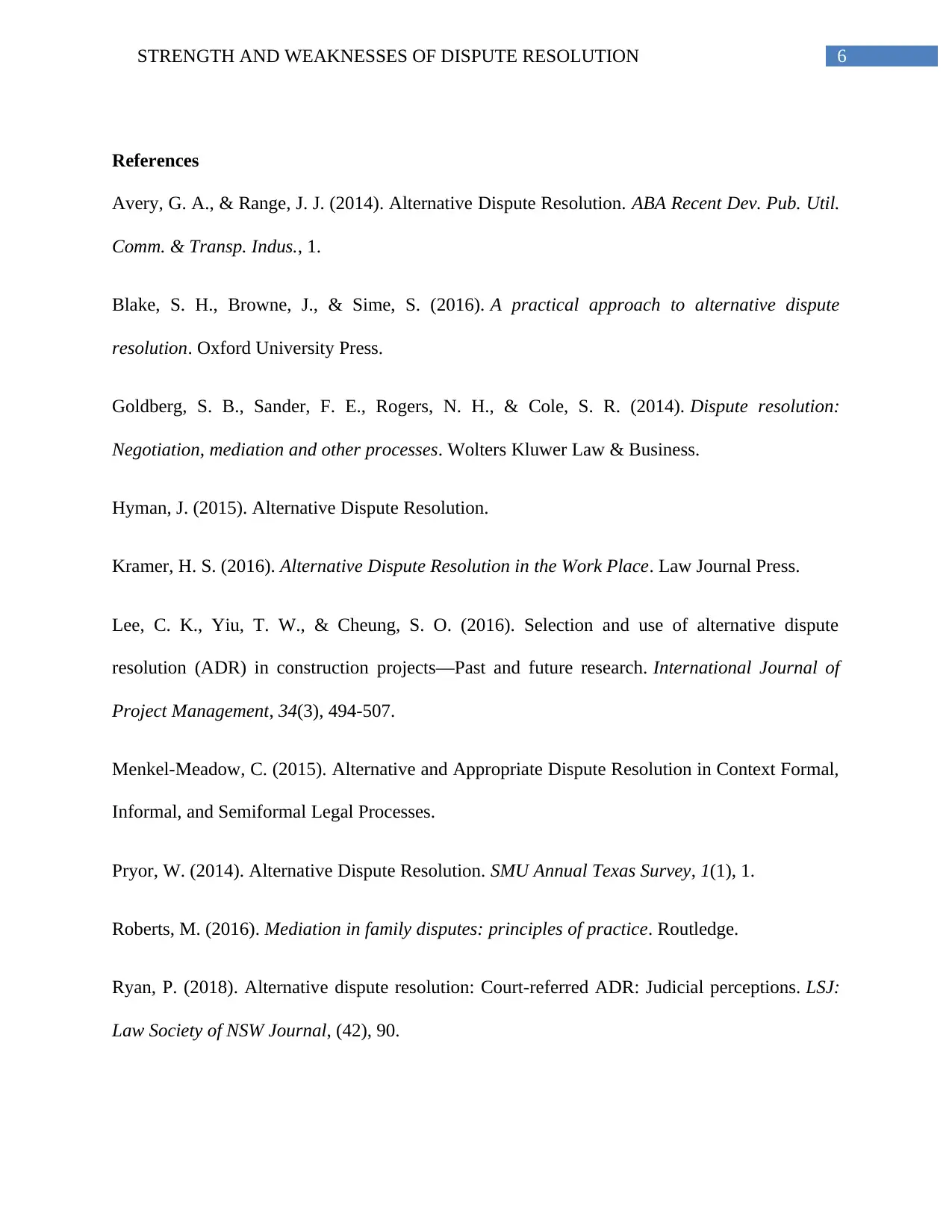
6STRENGTH AND WEAKNESSES OF DISPUTE RESOLUTION
References
Avery, G. A., & Range, J. J. (2014). Alternative Dispute Resolution. ABA Recent Dev. Pub. Util.
Comm. & Transp. Indus., 1.
Blake, S. H., Browne, J., & Sime, S. (2016). A practical approach to alternative dispute
resolution. Oxford University Press.
Goldberg, S. B., Sander, F. E., Rogers, N. H., & Cole, S. R. (2014). Dispute resolution:
Negotiation, mediation and other processes. Wolters Kluwer Law & Business.
Hyman, J. (2015). Alternative Dispute Resolution.
Kramer, H. S. (2016). Alternative Dispute Resolution in the Work Place. Law Journal Press.
Lee, C. K., Yiu, T. W., & Cheung, S. O. (2016). Selection and use of alternative dispute
resolution (ADR) in construction projects—Past and future research. International Journal of
Project Management, 34(3), 494-507.
Menkel-Meadow, C. (2015). Alternative and Appropriate Dispute Resolution in Context Formal,
Informal, and Semiformal Legal Processes.
Pryor, W. (2014). Alternative Dispute Resolution. SMU Annual Texas Survey, 1(1), 1.
Roberts, M. (2016). Mediation in family disputes: principles of practice. Routledge.
Ryan, P. (2018). Alternative dispute resolution: Court-referred ADR: Judicial perceptions. LSJ:
Law Society of NSW Journal, (42), 90.
References
Avery, G. A., & Range, J. J. (2014). Alternative Dispute Resolution. ABA Recent Dev. Pub. Util.
Comm. & Transp. Indus., 1.
Blake, S. H., Browne, J., & Sime, S. (2016). A practical approach to alternative dispute
resolution. Oxford University Press.
Goldberg, S. B., Sander, F. E., Rogers, N. H., & Cole, S. R. (2014). Dispute resolution:
Negotiation, mediation and other processes. Wolters Kluwer Law & Business.
Hyman, J. (2015). Alternative Dispute Resolution.
Kramer, H. S. (2016). Alternative Dispute Resolution in the Work Place. Law Journal Press.
Lee, C. K., Yiu, T. W., & Cheung, S. O. (2016). Selection and use of alternative dispute
resolution (ADR) in construction projects—Past and future research. International Journal of
Project Management, 34(3), 494-507.
Menkel-Meadow, C. (2015). Alternative and Appropriate Dispute Resolution in Context Formal,
Informal, and Semiformal Legal Processes.
Pryor, W. (2014). Alternative Dispute Resolution. SMU Annual Texas Survey, 1(1), 1.
Roberts, M. (2016). Mediation in family disputes: principles of practice. Routledge.
Ryan, P. (2018). Alternative dispute resolution: Court-referred ADR: Judicial perceptions. LSJ:
Law Society of NSW Journal, (42), 90.
Paraphrase This Document
Need a fresh take? Get an instant paraphrase of this document with our AI Paraphraser

7STRENGTH AND WEAKNESSES OF DISPUTE RESOLUTION
Singer, L. (2018). Settling disputes: Conflict resolution in business, families, and the legal
system. Routledge.
Singer, L. (2018). Settling disputes: Conflict resolution in business, families, and the legal
system. Routledge.
1 out of 8
Related Documents
Your All-in-One AI-Powered Toolkit for Academic Success.
+13062052269
info@desklib.com
Available 24*7 on WhatsApp / Email
![[object Object]](/_next/static/media/star-bottom.7253800d.svg)
Unlock your academic potential
Copyright © 2020–2026 A2Z Services. All Rights Reserved. Developed and managed by ZUCOL.





